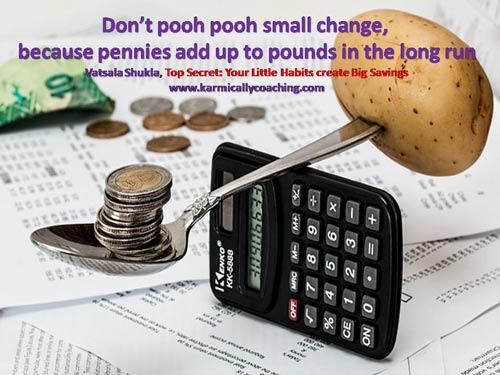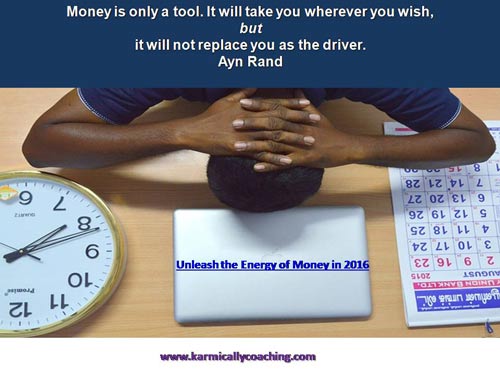This post has already been read 2645 times!

Last week we looked at 3 big ticket items where habit modification and action results in big savings, more money in your pocket and stops unnecessary outflow of money. All while maintaining your lifestyle.
In the concluding part of the Money Management series, we’ll look at 3 more practical areas where the pennies add up to pounds in the long run.
Learn the Art of Car Maintenance
There’s no Zen theory here but a stitch in time saves nine. If you own a car, then maintaining a regular servicing of the vehicle by an authorized vehicle service provider can identify immediately remediable wear and tear on your car. This results in significant savings because regular oil and filter changes, wheel rotation, checking and replacement of brake pads keeps the car in good condition.
Combine recommended mileage checks with your weekly and monthly self inspection for battery, water and tyre pressure. Check your vehicle’s maintenance manual and see what other self inspections are required on a seasonal basis.
Annual Maintenance of Home Appliances
Make a list of all annual maintenance items for your home such as air conditioner, heater, hot water heater, etc. Once again, being prepared and working in a proactive manner can save you unnecessary expenses.
For example, if you get your air conditioners annual service done during Spring, then you lower the risk of something going wrong during the hot summer months. That’s when it is quite costly to repair as the demand for maintenance is higher.
Likewise for room heaters in the cold winter months. Find out if the dealer from whom you purchase home essential items offer an Annual Maintenance Contract or AMC and the warranty periods with extensions.
Consider Repairing instead of Replacing Items
There are of course items which are not covered by AMCs and in this case, the prudent consideration and question is to repair or replace the said item. A good example is furniture and fixtures. If the basic structure is in good condition, then perhaps a change of upholstery or refurbishment may be more cost effective.
Even with televisions, washing machines and air conditioners which are no longer working at full efficiency, consider the cost of repair against the cost of replacing the item.
Sometimes it makes economic sense to replace electrical items as advances in technology result in more efficient products both in terms of electricity consumption and pollution. Look out for festive and exchange offers where the old equipment can be exchanged for a discount in the price of the new equipment.
Do comparison shopping for expensive items to get a feel of the prices. Dealers often make concessions on their margins, and you might yet get a bargain. The effort is worth it. No one likes to think that if they had shopped around a little more, they could have purchased an item for 10-15% less money.
There are many other ways to save money without compromising on one’s lifestyle. What works for one person may not necessarily work for another so choose actions that fit in with your circumstances. Choose those that are best suited to you.
4 Ways to Keep your Money Management Motivation in Top Gear
In addition to the 10 tips shared over the last 3 weeks, there are some non-monetary suggestions to help you stay inspired and motivated. Try one or all as the case may be.
Identify your spending triggers
Just like some of us indulge in comfort eating when depressed, sad, lonely, stressed, or anxious, these feelings can also act as a trigger for unnecessary spending, to get a ‘feel good’ boost.
For example, when you are bored, you go to the shops or the mall. Although you might have some necessary expenditure you end up buying non-essentials out of the ‘need’ to spend money.
In such cases, it helps to ascertain the actual problem and work on factors that you can control.
Retail therapy in small doses is good but not when it burns a hole in your pocket. Consider leaving your credit and debit cards at home on such outings. Or stepping back before making a purchase and ask yourself if you really need the item in question.
If you are prone to excessive spending when experiencing stress, this post on stress triggers will be helpful – Case Study: Do You Know Your Stress Triggers?
Be kind to yourself – give yourself a treat
Here we are talking of avoiding going into a complete abstention mode. Giving up the things that you like will not help your cause unless you have super strong willpower. The more you avoid something, the more it will obsess you.
For example, if you are fond of dining at a particular restaurant, treat yourself to a meal there once a month instead of once a week.
There is a way to make sure that you have the money for monthly treats for yourself. I’ve shared the method in Money Success Secret: The Alchemy of Mindset and Management available in all Amazon Markets.
I also have a free resource for you – the replay of my teleclass – 3 important actions you need to manage your money. Click here for the details of the teleclass or on the image below and access it asap!
Live within your means
There is a saying in Hindi that one should only stretch ones legs as far as one’s bed sheet. In other words, live within your means. The best way to get into debt and financial crisis is to spend beyond your means.
We all want the best things in life, but happiness cannot be measured in monetary terms. Be grateful for what you have and accept your financial position. Use the tips provided to achieve more for your money but don’t go after things that you cannot afford. If the purchase requires time, then plan the expenditure.
Quite a few of the readers of the previous post shared their experiences and confirmed that one of their money management tools was to live within their means. So you see, it can be done!
Track your success for motivation
It always helps to see your success in saving money in writing. Keeping a money journal is a sure way to keep you on track while heading to the highway of success. Success can be in the form of small amounts or big ones. It could include deferring expenditure until the after Christmas sale and acquiring the same item at a lower price. Remember, success is success.

At the end of the day, learn to enjoy life rather than possessions. Being happy is any day better than spending money on things that you might not actually need or to maintain a pseudo lifestyle.
If something is really important to maintain your lifestyle, then work on making the money available through a Money Spending Plan. Avoid stressing out just because you don’t have it.
Your turn! Are there any small ticket areas where you’ve created savings for bigger and more important needs? Tell me about it in the comments box below.




 I adhere to the Certified Coaches Alliance Code of Ethics and Standards. A copy is available on request.
I adhere to the Certified Coaches Alliance Code of Ethics and Standards. A copy is available on request.
 Let's Talk through the Connect Form:
Let's Talk through the Connect Form:
Great post! Fortunately, my hubby is great with maintaining the car and our home, and I can manage clothing repairs. Identifying spending triggers is an excellent strategy.
Great article Vatsala! Spending money can be like a drug and sadly too many people look at what they can buy on credit instead of what they actually have. I take good care of my car, I have had it for 10 years and bought it brand used..My father was a car sales man and he always told me, don’t take the new car hit, buy used, a year or 2 old and you will be much better off.
Sadly our society promotes spending and not being accountable, such a different world we live in from our parents…its good to save money and buy wisely. Great article Vasala
Thanks Lisa. I love my car and make sure that it goes for regular services. My present car has been with me since 10 years and is fighting fit. 🙂 There have been models of that make but my service dealer told me that my model is the best and to keep it going as long as I can. It is interesting how our father’s influence us. My Dad told me to buy a second hand car as a first time buyer because he knew that if I had any accidents, it would be a learning experience. This car was 2 years old and a Honda Prelude which I used for a solid 15 years! It’s still with me though not driven as much now and all because I maintained it.
It is good to save money and buy wisely.
Totally agree with contemplating repairing versus buying new. We’ve been living too long in a society and environment where over consuming in the norm.
Whether it’s electronics, shoes, or cars, the cost of buying new is so tempting because it’s really close to repairing it.
There are situations though where this can be done – I’m all for that if I can make it work.
Stepping back to consider whether an item can be repaired or replaced also acts as a check on our spending and helps us to take informed decisions, Delia. It also helps us to reduce electronic garbage. Fortunately nowadays there are specialized junk dealers who actually pay money for these items and ensure that they are disposed off without harming the environment. My rule of thumb is if the cost of repairing is the same or approximate to that of replacing, then I go with the latter and look for deals where I can get a good exchange offer on the item that I am disposing off. I save tons of money which I use to fulfill other needs and wants. 🙂
Just last week my daughter and I were in a large grocery store and ended up behind a woman who was “price checking” every single item she had in her cart. The store policy was to match prices and I was shocked at how much it appeared she was saving. Especially as a large box of diapers, which they didn’t want to honour because it wasn’t the same as the one she was buying, led to a five minute delay until finally the store agreed to match. She saved $10 on one item! It made me wonder if the app she was using was worth downloading. 🙂 Personally I am very price conscious and look to save money wherever I can when shopping. I used to document every nickel I spent when I was young, and have chosen now to be less fixated on money and to live my life trusting that I have a good grasp of what my life costs. Unfortunately our dollar is currently very depressed and now our food prices are going sky high, which will be an issue for the organic shopper in me. Thanks for the great 3-part series on money management, Vatsala! A very key topic for us all.
Thanks for sharing this interesting story, Beverley. This lady is good bargain hunter and money manager. I tend to be more lenient and go for the more expensive food items and even have shops where they give me a discount on the MRP but that is only for the biggies. Most stores do run deals on Wednesdays and if one is willing to be part of a rush, then well worth saving hundreds on essential food items. I’m happy you enjoyed the series.
LIving within our means is how we are able to live a good life and help others. I’m fortunate that my husband believes in the 5 P’s, Prior Planning Prevents Poor Performance. What this means is he takes car of car, household filters and applianes. Sometimes we do decide to replace rather than repair. I think the thing we enjoy the most,after being generous to our kids we emptying our pockets of change into a big jar and seeing how much accumulates each year.
I love your husband’s 5 P’s Roslyn – it is my kind of a mantra! The money jar is a great place to store change and see how much accumulates over a period of time. That is good money which can be used to cover some of our wants and needs.
These are great tips. It’s amazing how much money can be saved by regular maintenance of things such as cars. This was something we always stressed with our kids.Repairing rather than replacing is also great advice – for the pocket and the world which is feeling the repercussions of our throw away society. Best advice is to enjoy life and not possessions – they can go up in flames in a matter of seconds as recently happened to a bunch of our fellow Aussies in Victoria during the bushfires. Thanks for sharing these tips.
I fully endorse your view, Tamuria. In a material society we often forget our true abundance and wealth and end up acquiring things that can be lost, like your example in a bushfire or other calamity. I still remember what my mechanic told me in 2010 when my car was smashed by a van at a red light and had to be repaired. His words of wisdom were that he could repair the car but if I had lost my life or had been injured, he could not fix it and told me to give thanks to God for saving me.